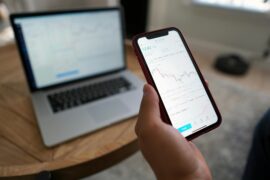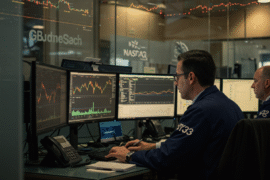This article may contain references to products or services from one or more of our advertisers or partners. We may receive compensation when you click on links to those products or services. Nonetheless, our opinions are our own.
The information presented in this article is accurate to the best of our knowledge at the time of publication. However, information is subject to change, and no guarantees are made about the continued accuracy or completeness of this content after its publication date.

Updated by Albert Fang
Those who are currently making investments in the financial sector are members of a generation that has always had access to a mobile device. They do almost everything, from banking to grocery shopping, on apps on their smartphones. SoFi Invest, like many other modern financial institutions, got its start as an app-based “micro-investment company,” where customers with low starting balances could still open trading accounts and participate in the stock market. For as little as $5, users of SoFi Invest can open a trading account and begin investing and saving for retirement with IRAs and cryptocurrency.
But there remains a problem. Many micro-investors with modest resources would like to put some of their money into large, well-known companies like Tesla or Google, but the price of a single share of these stocks typically ranges from $75 to $200 or more. Here we introduce the idea of fractional shares. Fractional shares work by allowing a person to, instead of purchasing a stock at its full price, purchase only a portion of one share of stock. A large percentage of people have no idea that this is even possible, let alone how it operates. Do you want to know how to buy fractional shares on SoFi Invest? Buying fractional shares on SoFi is actually fairly easy. To get a handle on things, it helps to take a step back and take in the big picture.
Ownership of a fractional share of stock is ownership of a portion of a stock, whether owned alone or in conjunction with others. If a share of stock is selling for $150 and you only have $50, you can still own a third of that stock by purchasing a fractional share. Because of the nature of the trade, most fractional shares are not shared or traded on the open market as a standalone product. Instead, fractional shares must be acquired through a brokerage.
In a typical stock transaction, shares are traded on an exchange, such as the New York Stock Exchange or the National Association of Securities Dealers (NASD). Investors can buy stocks and add them to their portfolios through brokerage accounts. When an investor buys or sells shares of stock, they typically pay a commission. Until recently, stock purchases through brokerages required the full purchase of a share, rather than a fraction of a share. With the introduction of fractional shares, investors can finally receive dividends in direct proportion to the value of their holdings. This means that a stockholder who only owns a third of a share will receive a third of the stock’s dividends regardless of how much of the share they actually own.
Why Buy Fractional Stocks
Numerous factors suggest that fractional shares represent a good option for the novice investor seeking a path toward long-term financial security. They make it easier for investors to get their hands on potentially profitable stocks by lowering the bar of entry. It’s a great way to broaden your investment portfolio’s horizons.
The most significant disadvantage of fractional shares is their rarity. Even SoFi Invest customers may have trouble locating the desired fractional share of a stock on an exchange that does not offer them. The cost of commission on a fractional share is likely to be the same as on a regular share because brokerage fees apply to all shares, not just whole ones, and are typically set by trade rather than per value of the stock.
Voted "Best Overall Budgeting App" by Forbes and WSJ
Monarch Money helps you budget, track spending, set goals, and plan your financial future—all in one app.
Get 50% OFF your first year with code MONARCHVIP
Enroll in SoFi Invest
If you want to know how to buy fractional shares on SoFi Invest, start by opening an account with SoFi, the first step for anyone interested in stock trading of any kind. SoFi Invest is a trading platform where investors can buy and sell stocks in all types of assets, including fractional shares, buying fractional shares on SoFi is a fairly simple process. SoFi refers to these as “Stock Bits.” These orders are not processed in real time, but rather are sent to the NYSE once a day, at 3:30 pm, by SoFi Invest. Stock Bits orders placed after this time will not be processed until the following business day.
Summary
Only a few short years ago, the idea of trading stocks from a smartphone while relaxing on a beach was considered absurd. Stock trading traditionally necessitated either close proximity to a live stockbroker at a brokerage firm or extensive time spent in front of a computer running trading software. Mobile apps have made it possible for people to trade stocks whenever they like, regardless of where they happen to be. Additionally, fractional shares have made it possible for new and younger investors to get their feet wet in the stock market by allowing them to purchase a substantial stake in a company for a much smaller initial investment. SoFi Invest is not the first online-only bank to offer these services to new traders, but it is one of the best in its field. Buying fractional shares on SoFi is easy and safe, and a wonderful way to start learning about stock trading.
FAQ
For novice investors, considering purchasing fractional shares is a good first step. If a new investor has a fixed budget but still wants a diversified portfolio, they might be better off investing $500 in fractional shares of 20 stocks than in two or three more expensive ones.
2. How much are the SoFi Invest commission fees?
SoFi Invest does not charge commission fees, so it does not cost the investor at all to invest in stock, either as whole stocks or fractional shares.

Reviewed and edited by Albert Fang.
See a typo or want to suggest an edit/revision to the content? Use the contact us form to provide feedback.
At FangWallet, we value editorial integrity and open collaboration in curating quality content for readers to enjoy. Much appreciated for the assist.
Did you like our article and find it insightful? We encourage sharing the article link with family and friends to benefit as well - better yet, sharing on social media. Thank you for the support! 🍉
Article Title: Guide on How to Buy Fractional Shares on SoFi Invest
https://fangwallet.com/2022/11/03/guide-on-how-to-buy-fractional-shares-on-sofi-invest/The FangWallet Promise
FangWallet is an editorially independent resource - founded on breaking down challenging financial concepts for anyone to understand since 2014. While we adhere to editorial integrity, note that this post may contain references to products from our partners.
The FangWallet promise is always to have your best interest in mind and be transparent and honest about the financial picture.
Become an Insider

Subscribe to get a free daily budget planner printable to help get your money on track!
Make passive money the right way. No spam.
Editorial Disclaimer: The editorial content on this page is not provided by any of the companies mentioned. The opinions expressed here are the author's alone.
The content of this website is for informational purposes only and does not represent investment advice, or an offer or solicitation to buy or sell any security, investment, or product. Investors are encouraged to do their own due diligence, and, if necessary, consult professional advising before making any investment decisions. Investing involves a high degree of risk, and financial losses may occur including the potential loss of principal.
Source Citation References:
+ Inspo












































